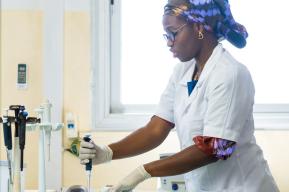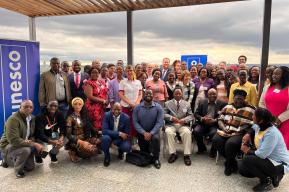News
University and its futures: Slovenian national dialogue on the futures of education

The event took up the invitation of the International Commission to engage in social dialogue on the futures of education. It was also held as a follow-up to discussions at the World Higher Education Conference in May 2022. Several high-level Slovenian speakers, including representatives from the ministries of education and of higher education, science and innovation, as well as guest speakers from neighbouring countries, shared their reflections during the event organised by the University of Ljubljana and the Slovenian National Commission for UNESCO.
The Vice-Rector of the University of Ljubljana, Ksenija Vidmar Horvat, underscored the multiple challenges that universities have faced in the past ten years. She explained that the purpose of the meeting was to reflect on the future of the university and education, and to construct a new social contract. “It is up to us today to try to set the first frameworks and starting points for further discussion,” she emphasized.
According to Urban Kodrič from the Ministry of Higher Education, Science and Innovation, the UNESCO Futures of Education Initiative came at the right moment for education in Slovenia, particularly as new national legislation was under development. He emphasized a core message from the UNESCO report that “no trend is destiny and that several alternative futures are possible,” adding that he was convinced that a new social contract “can also be co-created by the Slovenian higher education community, if it has a vision and enough courage to realize it.”
Knowledge and learning: The basis of renewal and transformation
Keith Holmes, from UNESCO’s Future of Learning and Innovation Division, outlined the main principles, arguments and recommendations in “Reimagining our Futures Together: a new social contract for education”, with a particular focus on higher education, knowledge production and research. He highlighted that there are at least four key debates and challenges in higher education today: the tension between competition and collaboration; the debate over digital technologies including Artificial Intelligence; the reproduction of disciplinary siloes in higher education teaching and research, and the challenge of marketisation and privatisation of higher education. He highlighted that “knowledge and learning are the basis for the renewal and transformation we need. Transforming higher education requires a multilateral effort that draws on a plurality of ways of knowing and doing from different contexts around the world”.
In his address, António Nóvoa, a member of the International Commission on the Futures of Education and Chair of the report drafting group, observed that “universities are only useful if they are different. It is in this difference that their ‘usefulness’ lies. A difference that also means openness, diversity, inclusivity, widening higher education to all ages in a time of exponential increases in life expectancy.”
The Rector of the University of Ljubljana, Gregor Majdič, said that due to the multiple crises facing the world - such as climate change, migration, and increasing inequalities – “universities must play a leading role by educating young people and discovering new knowledge, how to solve these problems and create a better society for all the inhabitants of our planet," he emphasized. This conference is such a contribution, by exploring a new role for universities and how to improve their role in solving societal challenges.
- Report of the International Commission on the Futures of Education: Reimagining our Futures Together: A new social contract for education.









